Becoming Kin: A Discussion with Patty Krawec
October 4, 2024
Author

On October 24th, 2024, the Centre for Human Rights Research (CHRR) and Centre for Creative Writing and Oral Culture (CCWOC) welcomed Anishinaabe-Ukrainian writer Patty Krawec to discuss her book Becoming Kin: An Indigenous Call to Unforgetting the Past and Reimagining Our Future (Broadleaf Books).
Patty weaves her story with broader themes of settler colonialism, Indigenous survival, and Indigenous thriving in Canada and the United States. She argues that Indigenous kinship systems can help everyone imagine and move toward a just, livable future for all. She examines the idea that we live in relationships and considers how we might live as good relatives by taking the lead from Indigenous peoples and philosophies.
This event was funded through CHRR’s Outreach and Events Support Initiative, which was made possible by the University of Manitoba’s Strategic Initiative Fund.

A Discussion on Indigenous Water (In)Security – HWISE-RCN
A Discussion on Indigenous Water (In)Security - HWISE-RCN
April 2022
HWISE-RCN
With the Household Water Insecurity Experiences (HWISE) – Research Coordination Network (RCN), Dr. Nicole Wilson chaired a panel discussion in April 2022 on the many complexities of water (in)security for Indigenous peoples. Panelists engaged with the ways that water (in)security is (re)produced by jurisdictional and regulatory injustices and the broader political and economic asymmetries created by settler-colonial water governance. They also explored the distinct understandings of security and well-being that flow from Indigenous relationships to water as a living entity and the ways they shape desirable water futures. View the discussion below.

The Lake St. Martin Story
March 12, 2025
Cameron Armstrong
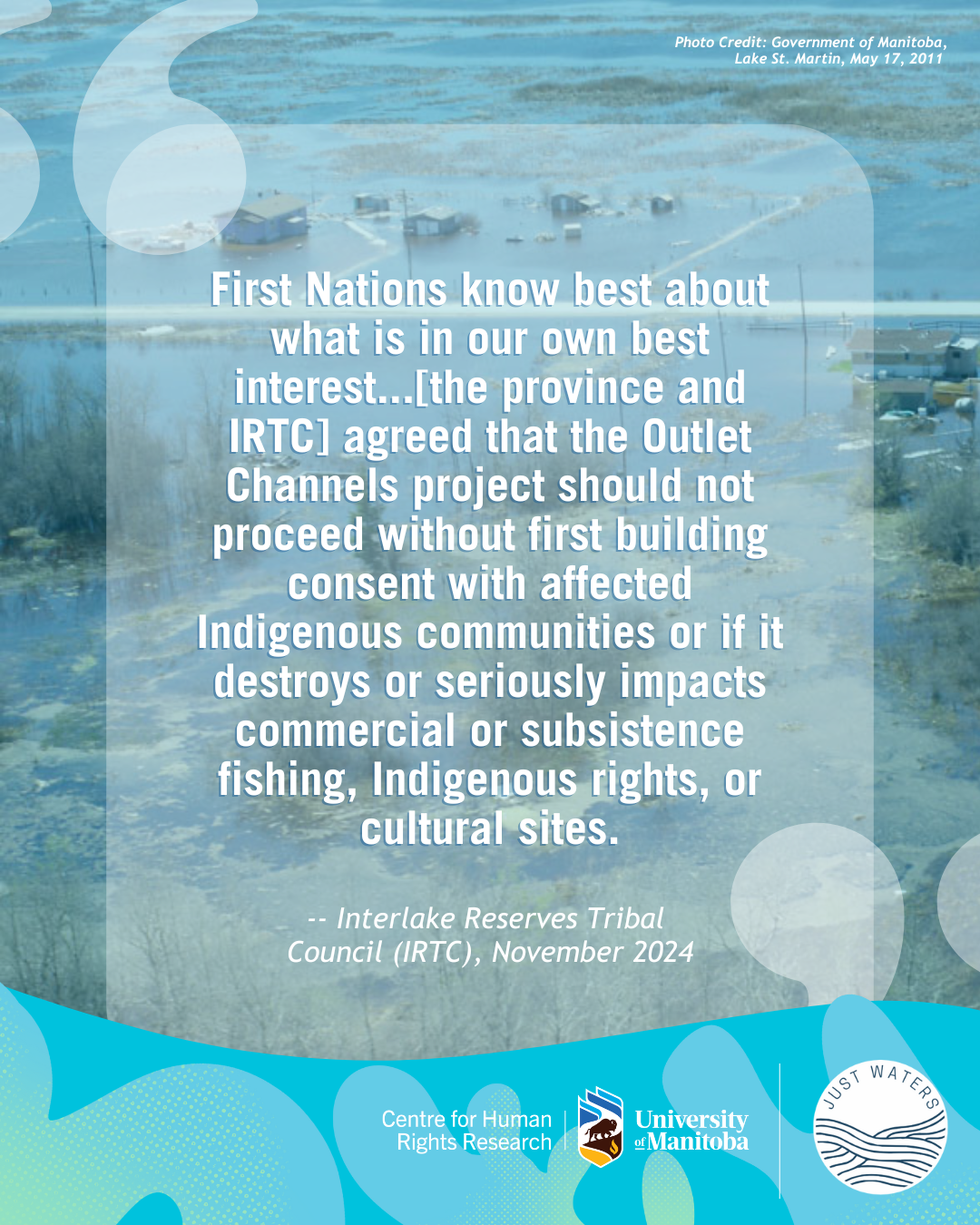
Water control structures have disempowered and displaced First Nations, destroying livelihoods in the name of development, upholding colonial systems and perpetuating environmental racism. One such case is that of Lake St. Martin and the Lake St. Martin First Nation.
As part of the Just Waters project, student RA Cameron Armstrong wrote a plain language summary giving an account of 50+ years of artificial flooding that have impacted the Lake St. Martin First Nation in a myriad of ways, including long term evacuation. Download the resource to find out more.

History in the Hot Seat Zotero Library
History in the Hot Seat Zotero Library
2025
Author
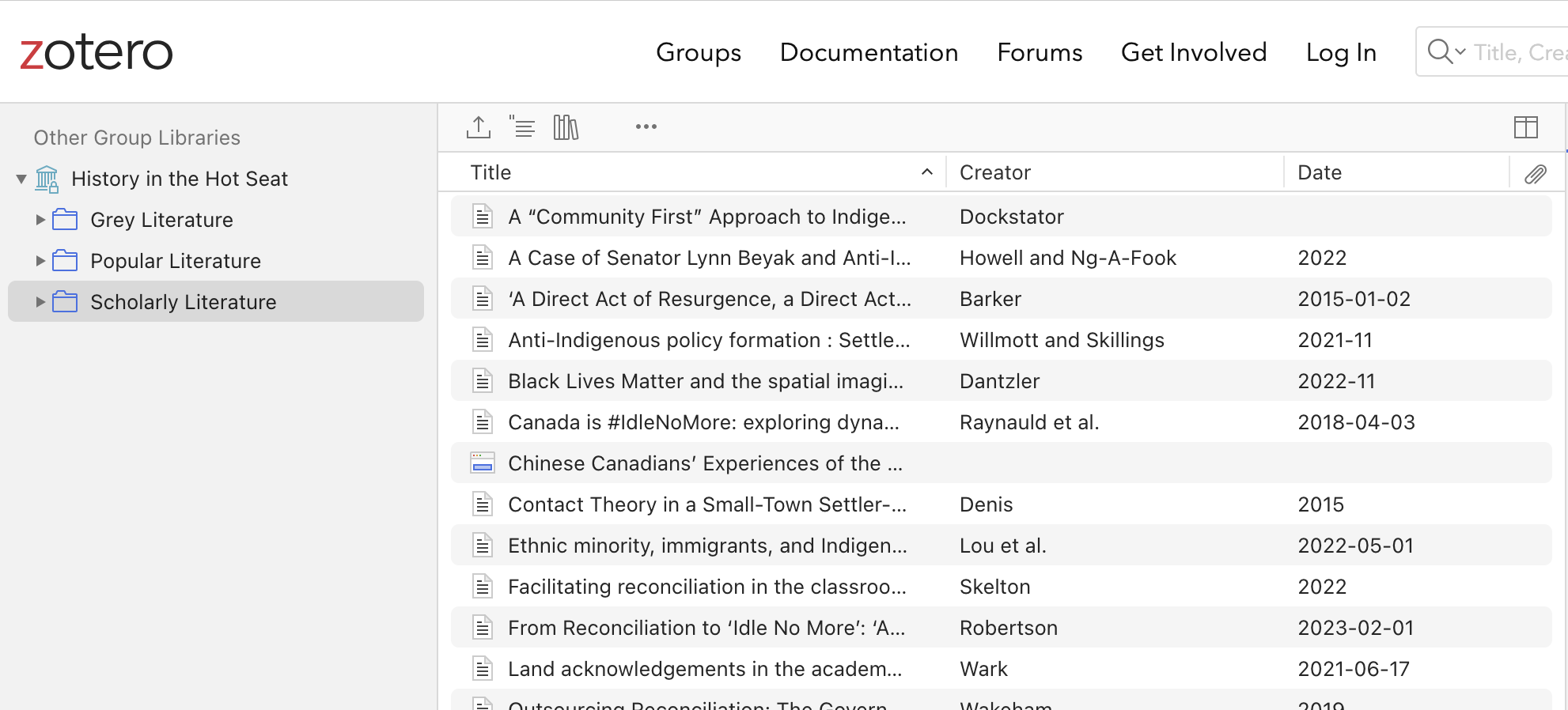
As a part of History in the Hot Seat; Colonialism and the Knowing and Teaching of Canada’s Past, a Zotero library was created to aid in gathering and organizing resources related to the project. Zotero is a free, easy-to-use tool to help you collect, organize, annotate, cite, and share research.
To access the Zotero library, click here.
The creation of this library was a collaborative project. We are grateful to student research assistants Hannah Belec, Katja Buchholz, and Jamie Nienhuysen for their work on this project.
History in the Hot Seat is a Knowledge Synthesis Grant funded by Social Sciences and Humanities Research Council (SSHRC) in partnership with Canadian Heritage, Genome Canada, and UK Research and Innovation’s Arts and Humanities Research Council (UKRI-AHRC) that aimed to mobilize, examine and synthesize social sciences and humanities research on Evolving Narratives of Cultures and Histories. To learn more about History in the Hot Seat, visit https://chrr.info/current-projects-2/past-projects/history-in-the-hot-seat-the-teaching-and-knowing-of-canadas-past/.

Missing the Bus Zotero Library
Missing the Bus Zotero Library
January 8, 2025
Angela Ciceron
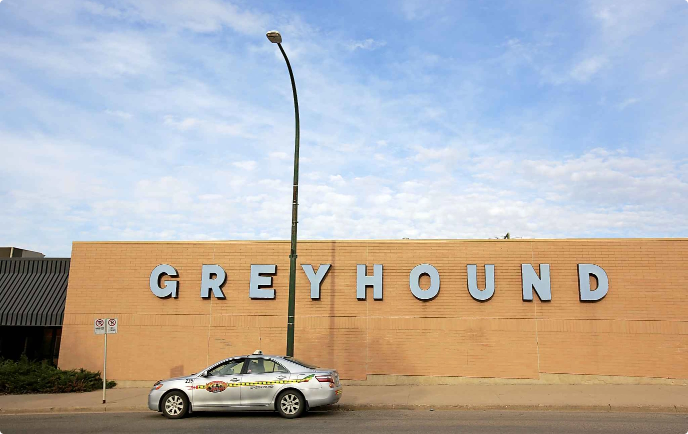
As a part of Missing the Bus, a Zotero library was created to aid in gathering and organizing resources related to the project. Zotero is a free, easy-to-use tool to help you collect, organize, annotate, cite, and share research.
To access the Zotero library, click here.
The creation of this library was a collaborative project. We are grateful to student research assistants Betchel Belachew, Hannah Bowers, Sarah Hourie, and Trixie Maybituin for their work on this project.
Missing the Bus is a Knowledge Synthesis Grant, funded by the Social Sciences and Humanities Research Council (SSHRC) and Infrastructure Canada to study public transit issues, identifying gaps and opportunities to guide policy-makers and service providers. To learn more about Missing the Bus, visit https://chrr.info/current-projects-2/missing-the-bus/.

The British Empire & the Culture War: When Colonial History Becomes Politics with Prof. Alan Lester
The British Empire & the Culture War: When Colonial History Becomes Politics with Prof. Alan Lester
December 11, 2024
Prof. Alan Lester
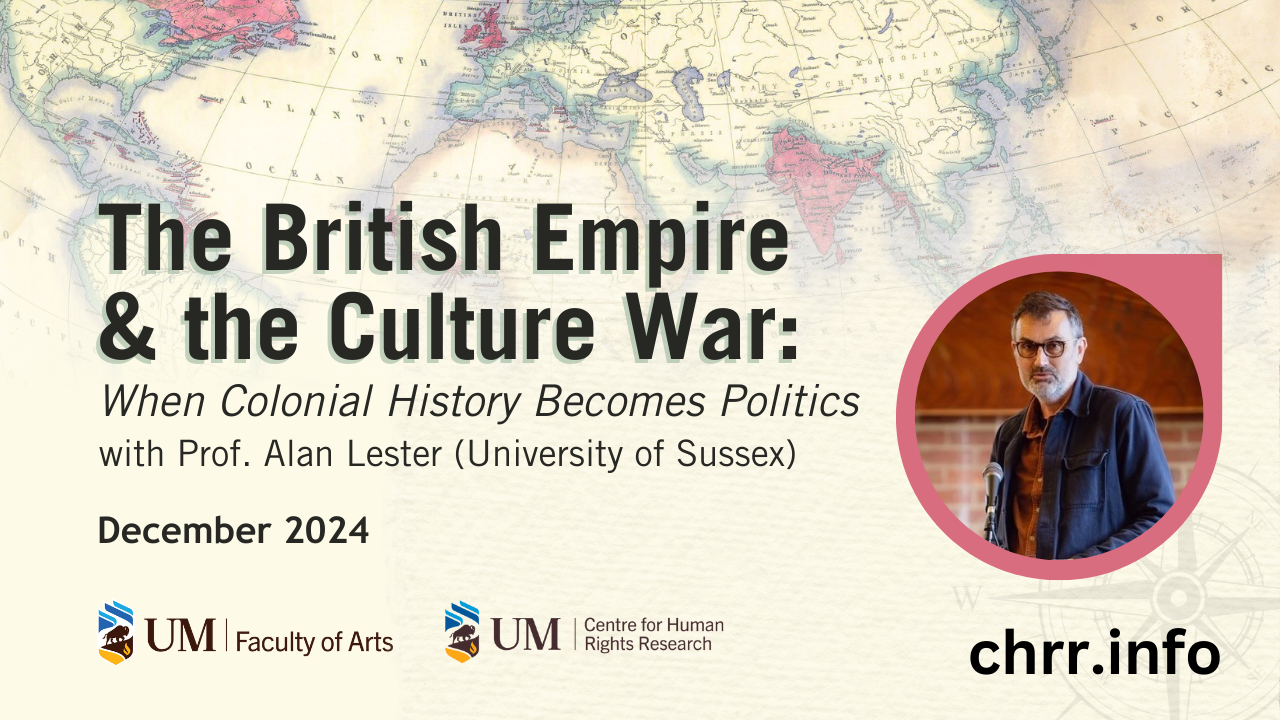
On Wednesday, December 11th at 2:00 pm, the Centre for Human Rights Research welcomed Prof. Alan Lester from the University of Sussex for a lecture on “The British Empire & The Culture War: When Colonial History Becomes Politics.”
Alan Lester is Professor of Historical Geography at the University of Sussex. He has held visiting lectureships at Rhodes University and the University of Fort Hare, an Erskine Fellowship at the University of Canterbury and an inaugural fellowship in humanities at La Trobe University. He has also been Research Professor (Historical Studies) at La Trobe. He is a Fellow of the Royal Historical Society and the co-editor of the Manchester University Press Studies in Imperialism series. Alan’s most recent edited collection The Truth About Empire: Real Histories of British Colonialism features a chapter by CHRR Director Dr. Adele Perry, CHRR Research Affiliate Dr. Sean Carleton, and CarletonU’s Dr. Omeasoo Wahpasiw titled “The Misuse of Indigenous and Canadian History in Colonialism.”

Indigenous Women, Girls, and Gender-Diverse People’s Human Right to Public Transportation – A Policy Brief
Indigenous Women, Girls, and Gender-Diverse People’s Human Right to Public Transportation - A Policy Brief
October 30, 2024
Trixie Maybituin
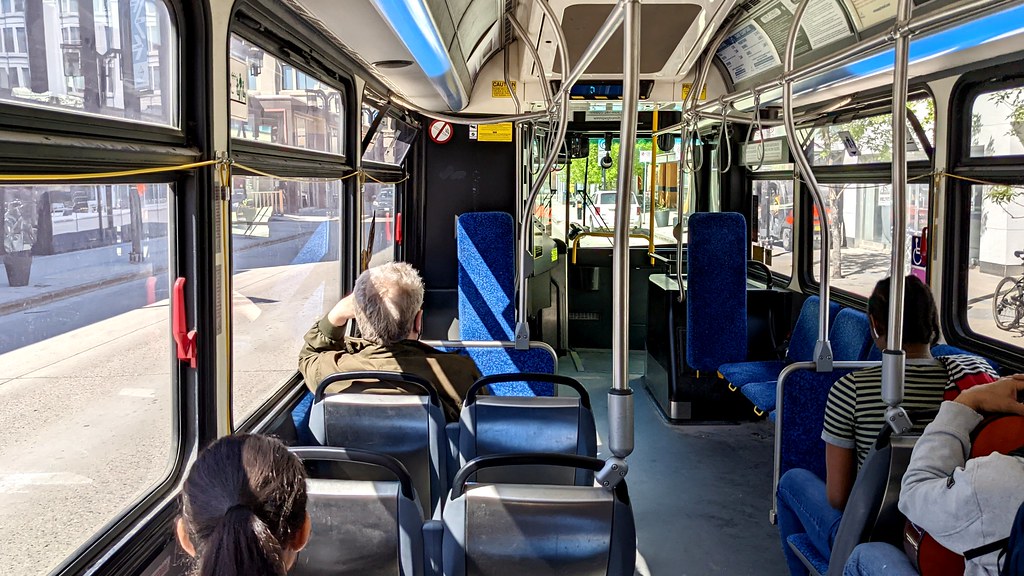
Content Warning:
This policy brief relates to missing and murdered Indigenous women and girls and Two-Spirit+ people and its content may be disturbing or triggering for readers. A reminder that the National Inquiry into Missing and Murdered Women and Girls has a free 24-hour Support Line available at: 1-844-413-6649.
This policy brief expands upon and asserts the idea of public transportation as a human rights issue. Specifically, the current state of public transportation pushes Indigenous women and Two-Spirit Plus people to dangerous and unsafe situations. Fulfilling various modes of public transportation is thus a human rights obligation, and failure to facilitate rights holders’ access to public transportation prompts potential human rights violations.
This policy brief flows from work completed as part of the “Missing the Bus: Indigenous Women and Two-Spirit Plus People and Public Transit in Western Canada” project. “Missing the Bus” was funded by a Social Sciences & Humanities Research Council (SSHRC)-funded Knowledge Synthesis Grant (2020).
We would also like to acknowledge Jessica Paley (Indigenous Relations Division at the City of Winnipeg), who contributed her knowledge and guidance to this policy brief.

An Evening with Katsi’tsakwas Ellen Gabriel & Sean Carleton (When the Pine Needles Fall)
An Evening with Katsi'tsakwas Ellen Gabriel & Sean Carleton (When the Pine Needles Fall)
October 30, 2024
Katsi'tsakwas Ellen Gabriel, Sean Carleton, and Kiera Ladner
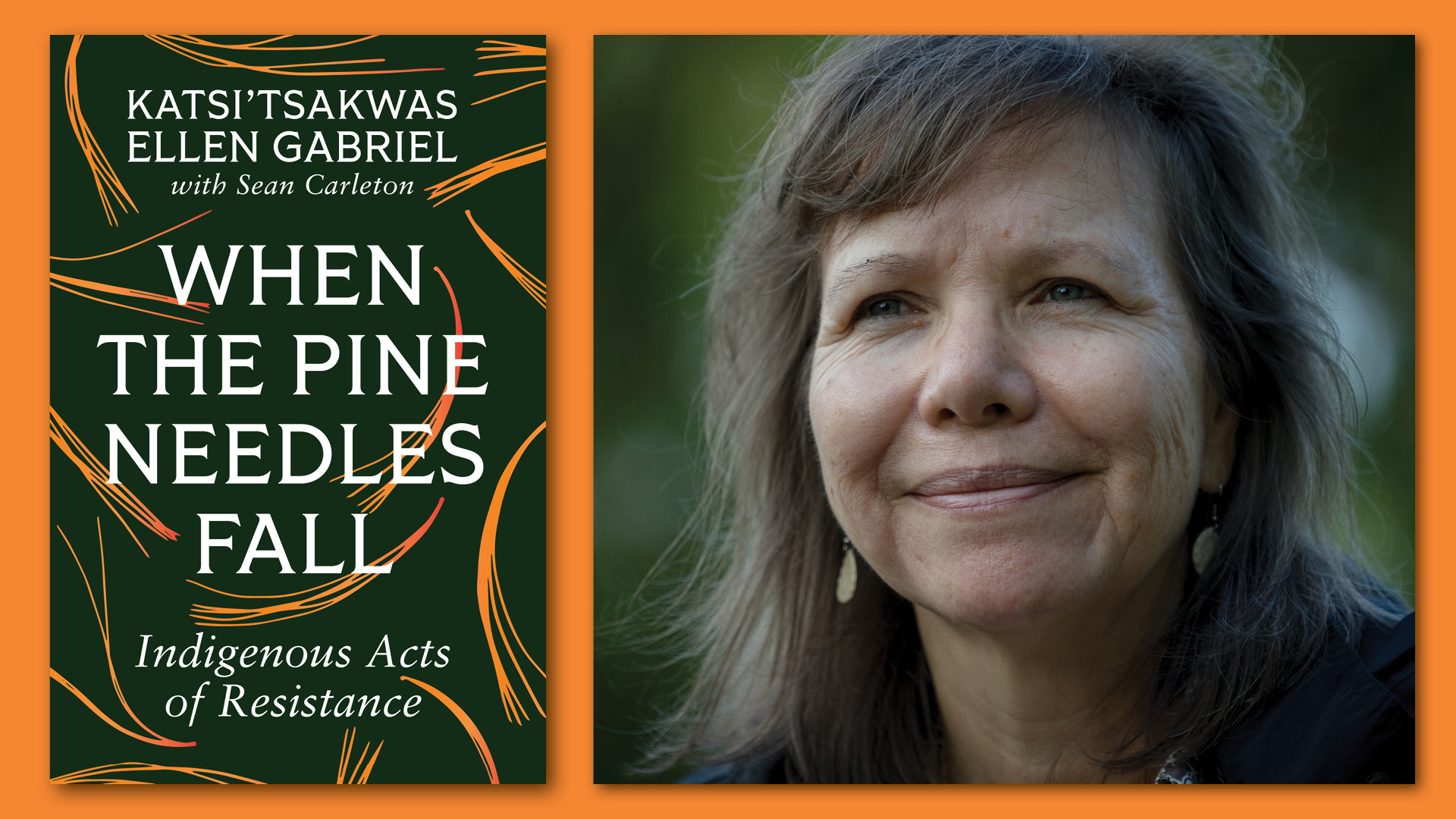
On Wednesday, October 2, 2024, the Centre for Human Rights Research (CHRR) and McNally Robinson Booksellers hosted Katsi’tsakwas Ellen Gabriel and Dr. Sean Carleton for a special evening to discuss their new book, When the Pine Needles Fall: Indigenous Acts of Resistance (Between the Lines). The event was hosted by CHRR Research Affiliate Dr. Kiera Ladner.
On When the Pine Needles Fall:
There have been many things written about Canada’s violent siege of Kanehsatà:ke and Kahnawà:ke in the summer of 1990, but When the Pine Needles Fall: Indigenous Acts of Resistance is the first book from the perspective of Katsi’tsakwas Ellen Gabriel, who was the Kanien’kehá:ka (Mohawk) spokesperson during the siege. When the Pine Needles Fall, written in a conversational style by Gabriel with historian Sean Carleton, offers an intimate look at Gabriel’s life leading up to the 1990 siege, her experiences as spokesperson for her community, and her work since then as an Indigenous land defender, human rights activist, and feminist leader. Gabriel’s hopes for a decolonial future make clear why protecting Indigenous homelands is vital not only for the survival of Indigenous peoples, but for all who live on this planet.

A Resource Guide on Missing and Murdered Indigenous Women, Girls, Two-Spirit and Gender Diverse People in Canada
A Resource Guide on Missing and Murdered Indigenous Women, Girls, Two-Spirit and Gender Diverse People in Canada
October 15, 2024
Angela Ciceron

Trigger Warning: The content in this resource guide may be difficult and/or triggering. If you or someone you know needs emotional assistance related to this topic or the information in this article, help is available 24/7 through the MMIWG Support Line, 1-866-413-6649.
In May 2024, the Centre for Human Rights Research and Indigenous Engagement and Communications hosted Cambria Harris in honour of Red Dress Day. This resource guide was created to provide a starting point for people seeking to educate themselves about the issue of missing and murdered Indigenous women, girls, Two-Spirit, and gender diverse people (MMIWG2S+) in Canada. It also lists resources for those seeking help or resources in line with MMIWG2S+.
Related Resources
Support Us
Whether you are passionate about interdisciplinary human rights research, social justice programming, or student training and mentorship, the University of Manitoba offers opportunities to support the opportunities most important to you.
Doing the Work: What Settlers need to know about the Residential School System: Infographic
Doing the Work: What Settlers need to know about the Residential School System: Infographic
October 1, 2024
Laura Majendaagoz
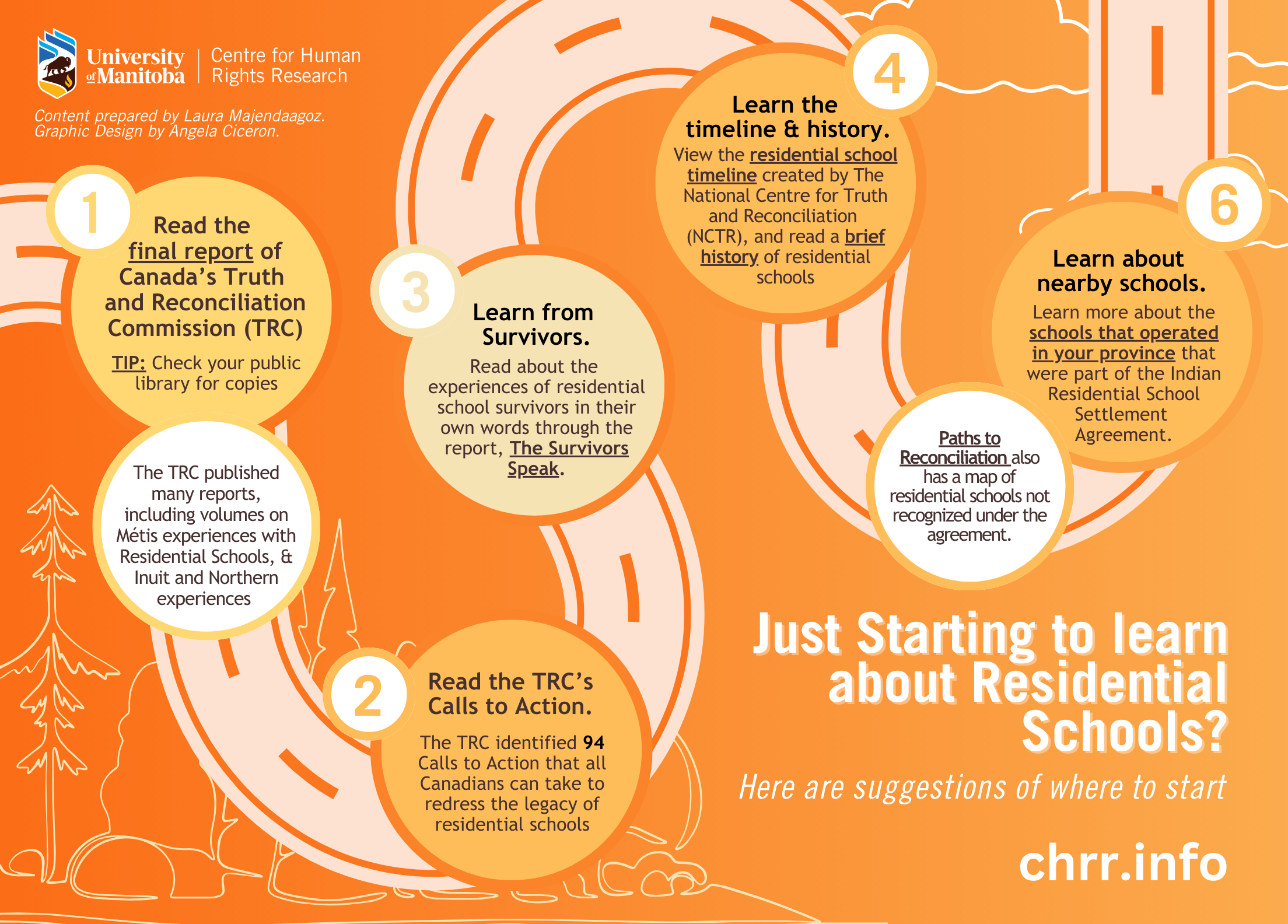
In honour of National Day for Truth and Reconciliation 2024, the CHRR has created an infographic from the resource guide, Doing the Work: What Settlers need to know about the Residential School System. This infographic is meant to guide those seeking to learn more about the residential schooling system through a step-by-step approach to navigating key documents from the Truth and Reconciliation Commission and the National Centre for Truth and Reconciliation.
Doing the Work: What Settlers need to know about the Residential School System is a resource guide developed by the panel from “Doing the Work: A virtual Q & A on what settlers need to know about the residential school system in Canada”, an event hosted by CHRR on Thursday, August 12th 2021. The resource guide was updated in August 2023.

Contact Us
We’d love to hear from you.
442 Robson Hall
University of Manitoba
Winnipeg, Manitoba
R3T 2N2 Canada
204-474-6453
Quick Links
Subscribe to our mailing list for periodic updates from the Centre for Human Rights Research, including human rights events listings and employment opportunities (Manitoba based and virtual).
Land Acknowledgement
The University of Manitoba campuses are located on original lands of Anishinaabeg, Ininew, Anisininew, Dakota and Dene peoples, and on the National Homeland of the Red River Métis.
Centre for Human Rights Research 2023© · Privacy Policy

